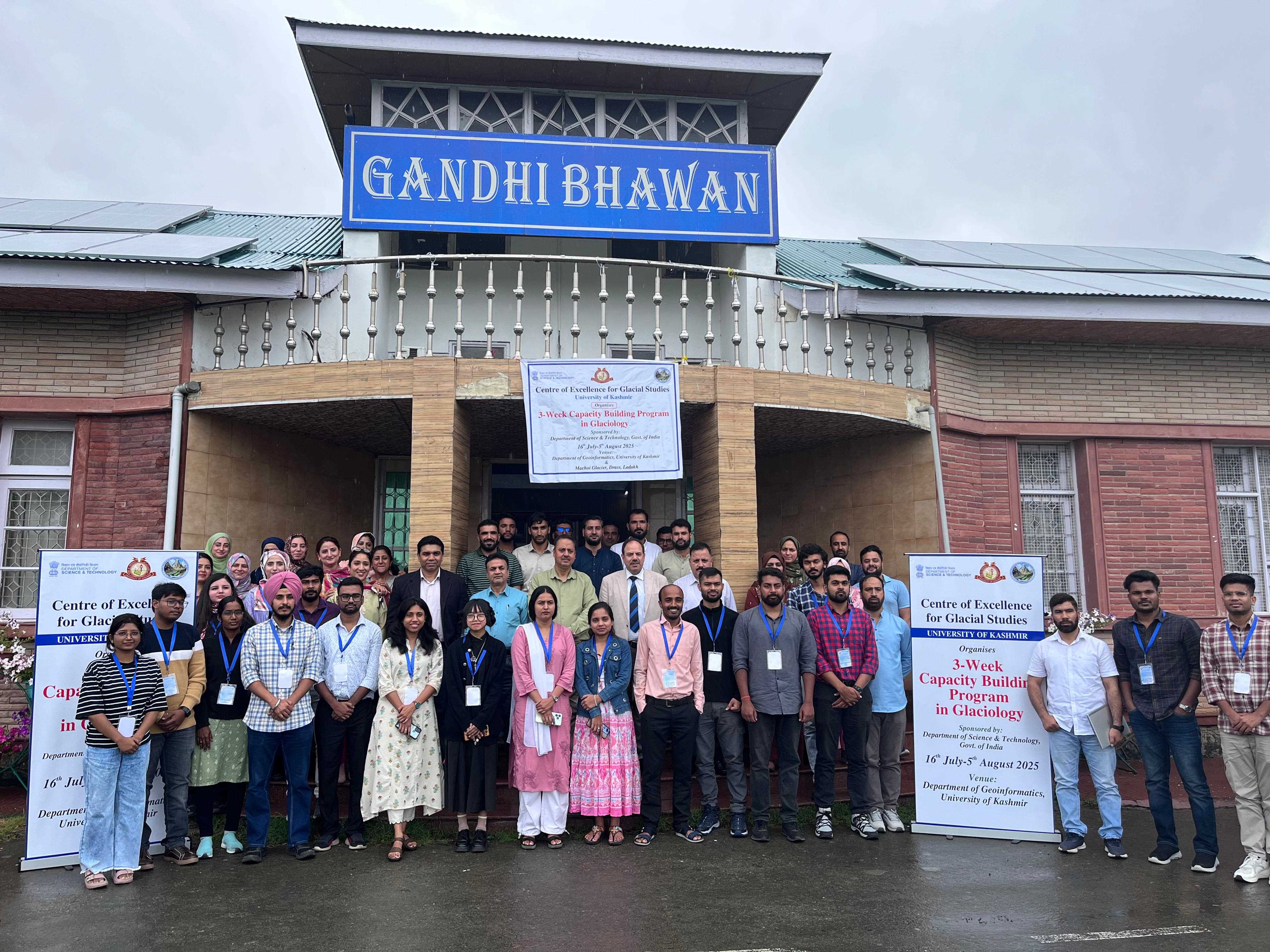
BK NEWS SERVICE
Srinagar, July 17: To strengthen research in cryospheric science and tackle the pressing challenges of climate change, the University of Kashmir (KU) inaugurated the 3rd three-week Capacity Building Programme in Glaciology at its main campus under its Centre of Excellence (CoE) for Glacial Studies in the Western Himalaya.
The programme, supported by the Department of Science and Technology (DST), Government of India, under the Climate Change Programme, is part of a national three-year project (2023–2026). It aims to equip early-career researchers with in-depth theoretical and practical knowledge in glaciology, focusing on the rapidly changing Himalayan cryosphere.
In her message, KU Vice Chancellor Prof. Nilofer Khan emphasized the urgent need for such initiatives. “In the face of accelerating climate change, fragile glacial ecosystems demand urgent scientific attention and stewardship. Programmes like these are essential for preparing young researchers and policymakers to address glacial retreat and its far-reaching impacts,” she said.
Prof. Khan credited funding under RUSA 2.0 for transforming research capacity at KU’s Department of Geoinformatics, allowing for significant infrastructure upgrades, including advanced GIS and remote sensing labs, high-resolution satellite data processing systems, and precision GPS tools.
Inaugurating the programme, Prof. Shakil A. Romshoo, Vice Chancellor of the Islamic University of Science & Technology (IUST) and Coordinator of the Summer School, highlighted the Himalayan cryosphere’s critical role in India’s food, water, and energy security. “There is an urgent need to strengthen cryospheric science and glacier monitoring in the Himalayas,” he stressed.
Dean Research KU, Prof. Mohammad Sultan Bhat, noted that the Centre has become a national hub for Himalayan cryospheric studies. “It’s heartening to see young scientists engaging in such advanced training at a time of unprecedented glacier changes,” he said.
Registrar KU, Prof. Naseer Iqbal, reaffirmed the University’s commitment to climate change research and policy-driven science. “The Himalayan glaciers are vital to the region’s ecology and economy. KU is determined to foster a new generation of evidence-driven researchers,” he stated.
Prof. Mohammad Farooq Mir, Head of the Department of Geoinformatics, urged participants to utilize the programme's rich resources in both field and lab settings.
Earlier, Dr. Khalid Omar Murtaza, Co-Investigator of the Centre, delivered the welcome address, and Dr. Reyaz Ahmad Dar, Co-Principal Investigator, presented the vote of thanks.
Around 20 participants from top institutions across India are attending the programme, which includes expert lectures, hands-on training, and project-based learning in glacial mass balance, hydrological modeling, remote sensing, glacial hazards, and climate change impact assessment.
The inaugural session was attended by faculty, researchers, and students from KU, IUST, and other national institutions, marking a strong start to three weeks of intensive scientific learning.
BK NEWS SERVICE
Srinagar, July 17: To strengthen research in cryospheric science and tackle the pressing challenges of climate change, the University of Kashmir (KU) inaugurated the 3rd three-week Capacity Building Programme in Glaciology at its main campus under its Centre of Excellence (CoE) for Glacial Studies in the Western Himalaya.
The programme, supported by the Department of Science and Technology (DST), Government of India, under the Climate Change Programme, is part of a national three-year project (2023–2026). It aims to equip early-career researchers with in-depth theoretical and practical knowledge in glaciology, focusing on the rapidly changing Himalayan cryosphere.
In her message, KU Vice Chancellor Prof. Nilofer Khan emphasized the urgent need for such initiatives. “In the face of accelerating climate change, fragile glacial ecosystems demand urgent scientific attention and stewardship. Programmes like these are essential for preparing young researchers and policymakers to address glacial retreat and its far-reaching impacts,” she said.
Prof. Khan credited funding under RUSA 2.0 for transforming research capacity at KU’s Department of Geoinformatics, allowing for significant infrastructure upgrades, including advanced GIS and remote sensing labs, high-resolution satellite data processing systems, and precision GPS tools.
Inaugurating the programme, Prof. Shakil A. Romshoo, Vice Chancellor of the Islamic University of Science & Technology (IUST) and Coordinator of the Summer School, highlighted the Himalayan cryosphere’s critical role in India’s food, water, and energy security. “There is an urgent need to strengthen cryospheric science and glacier monitoring in the Himalayas,” he stressed.
Dean Research KU, Prof. Mohammad Sultan Bhat, noted that the Centre has become a national hub for Himalayan cryospheric studies. “It’s heartening to see young scientists engaging in such advanced training at a time of unprecedented glacier changes,” he said.
Registrar KU, Prof. Naseer Iqbal, reaffirmed the University’s commitment to climate change research and policy-driven science. “The Himalayan glaciers are vital to the region’s ecology and economy. KU is determined to foster a new generation of evidence-driven researchers,” he stated.
Prof. Mohammad Farooq Mir, Head of the Department of Geoinformatics, urged participants to utilize the programme's rich resources in both field and lab settings.
Earlier, Dr. Khalid Omar Murtaza, Co-Investigator of the Centre, delivered the welcome address, and Dr. Reyaz Ahmad Dar, Co-Principal Investigator, presented the vote of thanks.
Around 20 participants from top institutions across India are attending the programme, which includes expert lectures, hands-on training, and project-based learning in glacial mass balance, hydrological modeling, remote sensing, glacial hazards, and climate change impact assessment.
The inaugural session was attended by faculty, researchers, and students from KU, IUST, and other national institutions, marking a strong start to three weeks of intensive scientific learning.
© Copyright 2023 brighterkashmir.com All Rights Reserved. Quantum Technologies